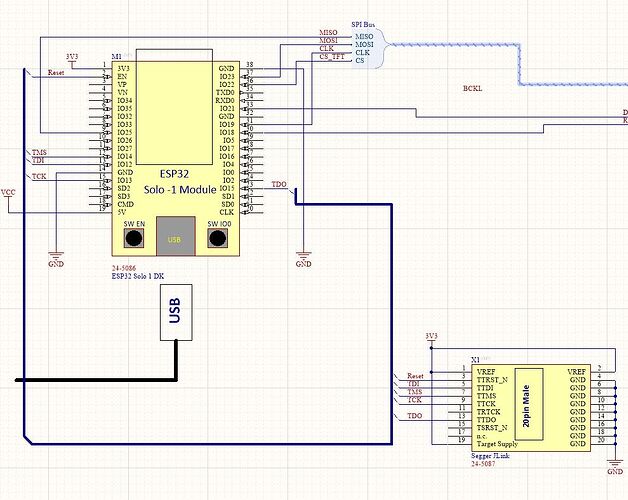My terminal log
DEPRECATED! A legacy library storage `D:\OneDrive\Dokumente\BrP967_ESP32\VSCode\SPI_Test\.piolibdeps` has been found in a project.
Please declare project dependencies in `platformio.ini` file using `lib_deps` option and remove `D:\OneDrive\Dokumente\BrP967_ESP32\VSCode\SPI_Test\.piolibdeps` folder.
More details -> http://docs.platformio.org/page/projectconf/section_env_library.html#lib-deps
Processing esp32dev (platform: espressif32; board: esp32-solo; debug_tool: jlink; upload_protocol: jlink; framework: espidf; monitor_speed: 115200; build_flags: -DCOMPONENT_EMBED_TXTFILES=image.jpg; lib_extra_dirs: D:\OneDrive\Dokumente\BrP967_ESP32\VSCode\SPI_Test\.piolibdeps)
------------------------------------------------------------------------------------------------------------------------------------------------------------
CONFIGURATION:
PLATFORM: Espressif 32 1.9.0 > Espressif ESP32 Dev Module
HARDWARE: ESP32 240MHz, 320KB RAM, 4MB Flash
DEBUG: Current (jlink) External (esp-prog, iot-bus-jtag, jlink, minimodule, olimex-arm-usb-ocd, olimex-arm-usb-ocd-h, olimex-arm-usb-tiny-h, olimex-jtag-tiny, tumpa)
PACKAGES: toolchain-xtensa32 2.50200.80 (5.2.0), framework-espidf 3.30202.190627 (3.2.2), tool-esptoolpy 1.20600.0 (2.6.0), tool-openocd-esp32 1.1000.20190708 (10.0), tool-mkspiffs 2.230.0 (2.30)
LDF: Library Dependency Finder -> http://bit.ly/configure-pio-ldf
LDF Modes: Finder ~ chain, Compatibility ~ soft
Found 0 compatible libraries
Scanning dependencies...
No dependencies
xtensa-esp32-elf-objcopy --input-target binary --output-target elf32-xtensa-le --binary-architecture xtensa --rename-section .data=.rodata.embedded image.jpg .pio\build\esp32dev\image.jpg.txt.o
xtensa-esp32-elf-gcc -o .pio\build\esp32dev\firmware.elf -T esp32_out.ld -nostdlib -Wl,-static -u call_user_start_cpu0 -Wl,--undefined=uxTopUsedPriority -Wl,--gc-sections -u __cxa_guard_dummy -u ld_include_panic_highint_hdl -T esp32.common.ld -T esp32.rom.ld -T esp32.peripherals.ld -T esp32.rom.libgcc.ld -T esp32.rom.spiram_incompatible_fns.ld -u __cxx_fatal_exception .pio\build\esp32dev\image.jpg.txt.o .pio\build\esp32dev\src\components\tjpgd\src\tjpgd.o .pio\build\esp32dev\src\decode_image.o .pio\build\esp32dev\src\pretty_effect.o .pio\build\esp32dev\src\spi_master_example_main.o -LC:\Users\Gerd\.platformio\packages\framework-espidf\components\esp32 -LC:\Users\Gerd\.platformio\packages\framework-espidf\components\esp32\ld -LC:\Users\Gerd\.platformio\packages\framework-espidf\components\esp32\ld\wifi_iram_opt -LC:\Users\Gerd\.platformio\packages\framework-espidf\components\esp32\lib -LC:\Users\Gerd\.platformio\packages\framework-espidf\components\bt\lib -LC:\Users\Gerd\.platformio\packages\framework-espidf\components\newlib\lib -L.pio\build\esp32dev -L.pio\build\esp32dev -Wl,--start-group .pio\build\esp32dev\libapp_update.a .pio\build\esp32dev\libasio.a .pio\build\esp32dev\libbt.a .pio\build\esp32dev\libcoap.a .pio\build\esp32dev\libconsole.a .pio\build\esp32dev\libcxx.a .pio\build\esp32dev\libdriver.a .pio\build\esp32dev\libesp-tls.a .pio\build\esp32dev\libesp_adc_cal.a .pio\build\esp32dev\libesp_event.a .pio\build\esp32dev\libesp_https_ota.a .pio\build\esp32dev\libesp_http_client.a .pio\build\esp32dev\libesp_http_server.a .pio\build\esp32dev\libesp_ringbuf.a .pio\build\esp32dev\libethernet.a .pio\build\esp32dev\libexpat.a .pio\build\esp32dev\libfatfs.a .pio\build\esp32dev\libfreemodbus.a .pio\build\esp32dev\libjsmn.a .pio\build\esp32dev\libjson.a .pio\build\esp32dev\liblog.a .pio\build\esp32dev\libmbedtls.a .pio\build\esp32dev\libmdns.a
.pio\build\esp32dev\libmicro-ecc.a .pio\build\esp32dev\libmqtt.a .pio\build\esp32dev\libnewlib.a .pio\build\esp32dev\libnghttp.a .pio\build\esp32dev\libnvs_flash.a .pio\build\esp32dev\libopenssl.a .pio\build\esp32dev\libprotobuf-c.a .pio\build\esp32dev\libpthread.a .pio\build\esp32dev\libsdmmc.a .pio\build\esp32dev\libsmartconfig_ack.a .pio\build\esp32dev\libspiffs.a .pio\build\esp32dev\libtcpip_adapter.a .pio\build\esp32dev\libtcp_transport.a .pio\build\esp32dev\libulp.a .pio\build\esp32dev\libvfs.a .pio\build\esp32dev\libwear_levelling.a .pio\build\esp32dev\libwifi_provisioning.a .pio\build\esp32dev\libxtensa-debug-module.a .pio\build\esp32dev\libapp_trace.a .pio\build\esp32dev\libaws_iot.a .pio\build\esp32dev\libesp32.a .pio\build\esp32dev\libbootloader_support.a .pio\build\esp32dev\libheap.a .pio\build\esp32dev\libsoc.a .pio\build\esp32dev\libspi_flash.a .pio\build\esp32dev\liblwip.a .pio\build\esp32dev\libprotocomm.a
.pio\build\esp32dev\libfreertos.a .pio\build\esp32dev\libsodium.a .pio\build\esp32dev\libwpa_supplicant.a -lbtdm_app -lhal -lcoexist -lcore -lnet80211 -lphy -lrtc -lpp -lwpa -lwpa2 -lespnow -lwps -lsmartconfig -lmesh -lc -lm -lgcc -lstdc++ -Wl,--end-group
"C:\Users\Gerd\.platformio\penv\Scripts\python.exe" "C:\Users\Gerd\.platformio\packages\tool-esptoolpy\esptool.py" --chip esp32 elf2image --flash_mode dio --flash_freq 40m --flash_size 4MB -o .pio\build\esp32dev\firmware.bin .pio\build\esp32dev\firmware.elf
<lambda>(["checkprogsize"], [".pio\build\esp32dev\firmware.elf"])
MethodWrapper(["checkprogsize"], [".pio\build\esp32dev\firmware.elf"])
Memory Usage ->
DATA: [ ] 4.1% (used 13380 bytes from 327680 bytes)
PROGRAM: [== ] 19.2% (used 201449 bytes from 1048576 bytes)
.pio\build\esp32dev\firmware.elf :
section size addr
.rtc.text 0 1074528256
.rtc.dummy 0 1073217536
.rtc.force_fast 0 1073217536
.rtc_noinit 0 1342177280
.rtc.force_slow 0 1342177280
.iram0.vectors 1024 1074266112
.iram0.text 47309 1074267136
Open On-Chip Debugger v0.10.0-esp32-20190708 (2019-07-08-11:04)
.dram0.data 7068 1073470304
Licensed under GNU GPL v2
.noinit 0 1073477372
.dram0.bss 6312 1073477376
debug_level: 2
.flash.rodata 49108 1061158944
adapter speed: 1000 kHz
.flash.text 96940 1074593816
Info : Configured 1 cores
esp32 interrupt mask on
.comment 303 0
Info : J-Link V11 compiled Aug 14 2019 16:21:09
.xtensa.info 56 0
Info : Hardware version: 11.00
.debug_line 111431 0
Info : VTarget = 3.166 V
Info : clock speed 1000 kHz
.debug_info 158087 0
Info : JTAG tap: esp32.cpu0 tap/device found: 0x120034e5 (mfg: 0x272 (Tensilica), part: 0x2003, ver: 0x1)
.debug_abbrev 33038 0
Info : Target halted. PRO_CPU: PC=0x40000
40.debug_aranges 3696 0
0
Info : Listening on port 3333.debug_str 25692 0
f
or.debug_frame 7848 0
g
db.debug_loc 102226 0
c
on.debug_ranges 3192 0
ne
ctTotal 653330
ionesptool.py v2.6
s
<lambda>(["upload"], [".pio\build\esp32dev\firmware.bin"])
Info : JTAG tap: esp32.cpu0 tap/device found: 0x120034e5 (mfg: 0x272 (Tensilica), part: 0x2003, ver: 0x1)
AVAILABLE: esp-prog, espota, esptool, iot-bus-jtag, jlink, minimodule, olimex-arm-usb-ocd, olimex-arm-usb-ocd-h, olimex-arm-usb-tiny-h, olimex-jtag-tiny, tumpa
CURRENT: upload_protocol = jlink
Info : esp32: Debug controller 0 was reset (pwrstat=0x5F, after clear 0x0F).
openocd -d2 -s C:/Users/Gerd/.platformio/packages/tool-openocd-esp32/share/openocd/scripts -f interface/jlink.cfg -f board/esp32-solo-1.cfg -c "program_esp32 {{.pio\build\esp32dev\firmware.bin}} 0x10000Info : esp32: Core 0 was reset (pwrstat=0x5F, after clear 0x0F).
veInfo : Target halted. PRO_CPU: PC=0x5000r0i0f4yB"
-cInfo : esp32: Core 0 was reset (pwrstat=0x1F, after clear 0x0F).
"Info : Target halted. PRO_CPU: PC=0x4000p0r4o0g0r
am** Programming Started **
_esauto erase enabled
p32 {{D:\OneDrive\Dokumente\BrP967_ESP32\VSCode\SPI_Test\.pio\build\esp32dev/bootloader.bin}} 0x1000 verify" -c "program_esp32 {{D:\OneDrive\Dokumente\BrP967_ESP32\VSCode\SPI_Test\.pio\build\esp32dev/partitions.bin}} 0x8000 verify" -c "reset run; shutdown"
Info : Target halted. PRO_CPU: PC=0x400916EE
Info : Flash mapping 0: 0x10020 -> 0x3f400020, 47 KB
Info : Target halted. PRO_CPU: PC=0x400916EE
Info : Auto-detected flash size 4096 KB
Info : Using flash size 4096 KB
Info : xtensa_poll: Target offline
Error: xtensa_poll: Target failure
Info : Target halted. PRO_CPU: PC=0x40090D79
Error: xtensa_wait_algorithm: not halted 0, pc 0x40090d79, ps 0x60025
Error: Failed to wait algorithm (-302)!
Error: Algorithm run failed (-302)!
Error: Failed to run flasher stub (-302)!
Error: failed erasing sectors 16 to 65
embedded:startup.tcl:480: Error: ** Programming Failed **
in procedure 'program_esp32'
in procedure 'program_error' called at file "C:/Users/Gerd/.platformio/packages/tool-openocd-esp32/share/openocd/scripts/target/esp32-solo-1.cfg", line 150
at file "embedded:startup.tcl", line 480
Warn : Flash driver of esp32.flash does not support free_driver_priv()
Warn : Flash driver of irom does not support free_driver_priv()
Warn : Flash driver of drom does not support free_driver_priv()
*** [upload] Error 1
=============================================================== [FAILED] Took 52.19 seconds ===============================================================
PS D:\OneDrive\Dokumente\BrP967_ESP32\VSCode\SPI_Test>
